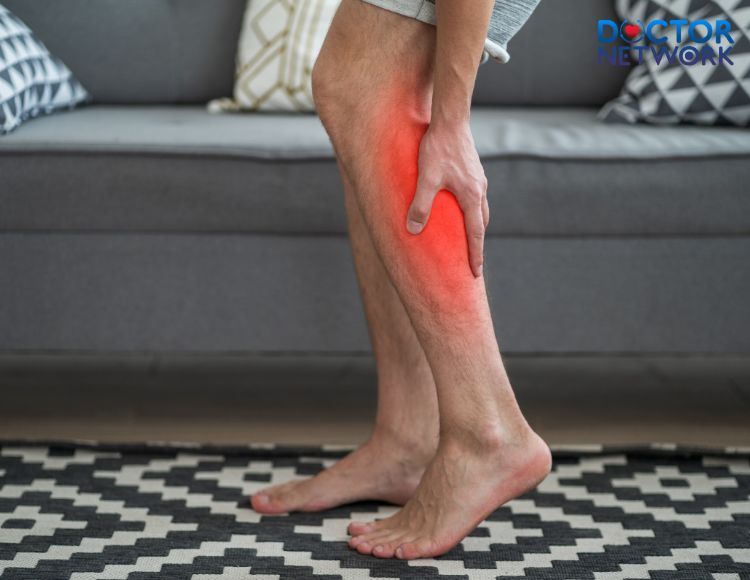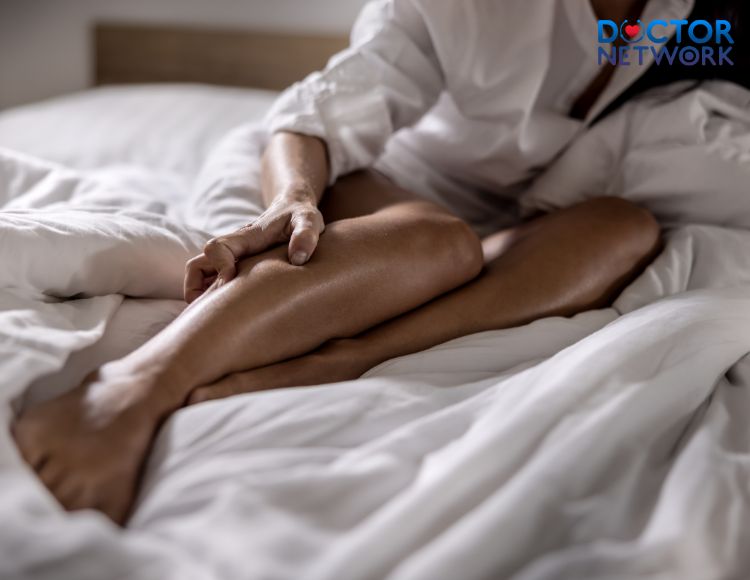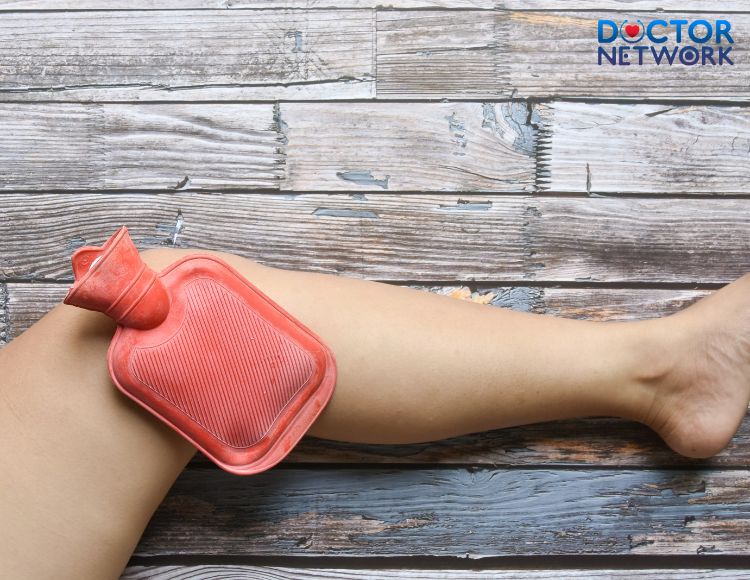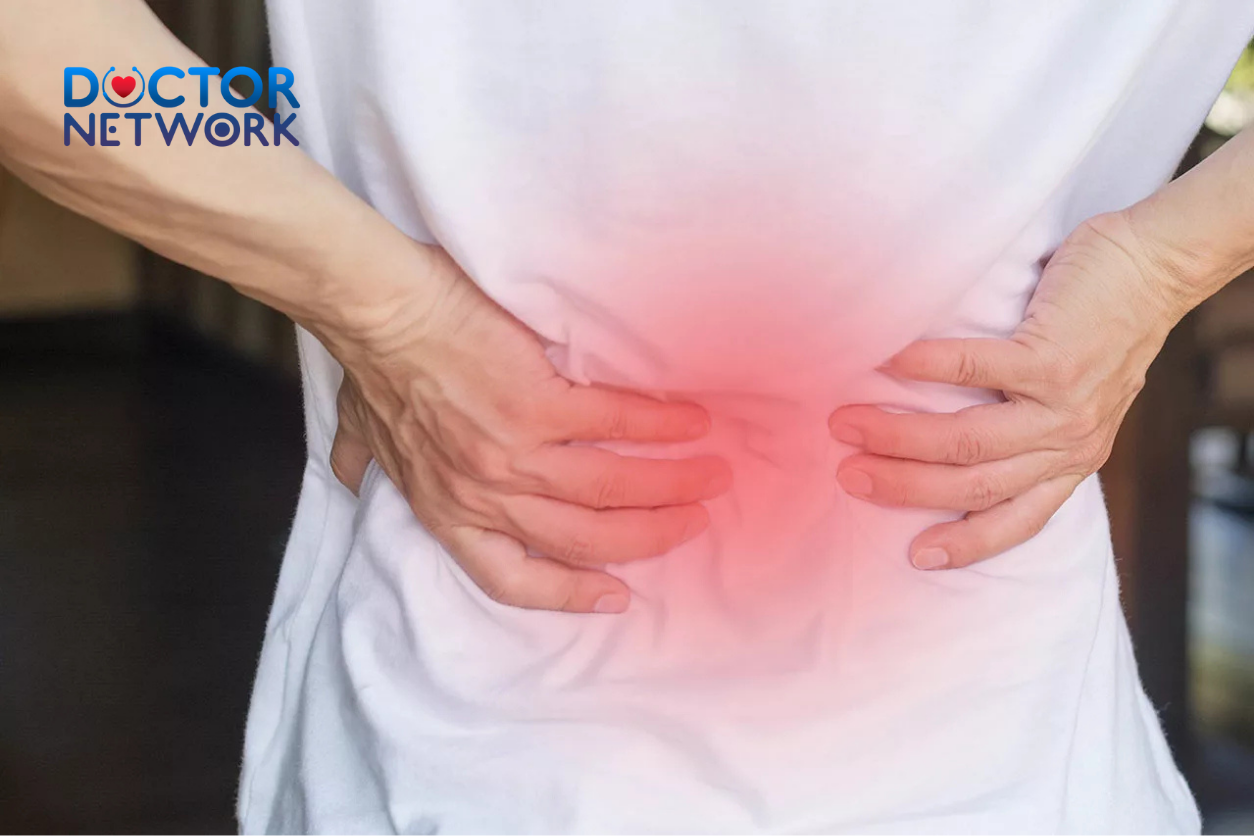Calf cramps during sleep can transform a peaceful night into a painful ordeal. These sudden, intense muscle contractions in the lower leg not only disrupt your slumber but can leave you feeling sore and fatigued the next day. If you’ve ever jolted awake with a searing pain in your calf, you’re not alone. Nocturnal leg cramps affect up to 60% of adults, with the calf being the most common site.
This comprehensive guide will explore “Why do you get calf cramps when you sleep“, effective management strategies, and prevention techniques. We’ll delve into the physiological mechanisms behind these painful spasms, discuss common triggers, and provide expert advice on when to seek medical attention.
Understanding Calf Cramps: The Anatomy of Nighttime Discomfort
Calf cramps, medically known as nocturnal leg cramps, are involuntary contractions of the gastrocnemius muscle. These spasms can strike without warning, causing intense pain that can last from a few seconds to several minutes.
What Exactly Are Calf Cramps?
Calf cramps occur when the muscle fibers in your lower leg contract forcefully and involuntarily. This contraction is often accompanied by:
- Sharp, intense pain in the calf muscle
- A visible or palpable hardening of the muscle
- Discomfort that can persist even after the cramp subsides

What is a calf cramp? It is an involuntary muscle contraction that causes pain and temporary stiffness
The duration of these cramps varies, but most last between a few seconds to 15 minutes. However, residual soreness can linger for hours or even days.
The Physiology Behind the Pain
To understand why calf cramps happen, we need to look at the intricate dance between nerves and muscles:
- Nerve signals: Cramps begin with excessive firing of motor neurons.
- Muscle contraction: These signals cause the muscle fibers to contract forcefully.
- Sustained contraction: The muscle remains contracted until the nerve signals subside.
This process is typically regulated by the body, but various factors can disrupt this balance, leading to cramps.

Why do I get calf cramps when I sleep? – It could be due to an improper sleeping position
Why do you get calf cramps when you sleep?
Several factors can contribute to nighttime calf cramps. Understanding these can help you identify potential triggers and take steps to prevent them.
1. Dehydration: The Silent Instigator
Dehydration is a leading cause of nocturnal leg cramps. When your body lacks sufficient water:
- Electrolyte balance is disrupted
- Blood volume decreases
- Muscles become more susceptible to cramping
To combat dehydration-induced cramps, aim to drink at least 8-10 glasses of water daily, more if you’re active or in hot weather.
2. Electrolyte Imbalance: The Mineral Deficiency Connection
Electrolytes play a crucial role in muscle function. An imbalance, particularly in magnesium, potassium, and calcium, can lead to cramps.
| Electrolyte | Function | Food Sources |
|---|---|---|
| Magnesium | Muscle relaxation | Leafy greens, nuts, seeds |
| Potassium | Nerve signal transmission | Bananas, potatoes, yogurt |
| Calcium | Muscle contraction | Dairy products, fortified foods |
Ensuring a balanced diet rich in these minerals can help prevent cramps.
3. Overexertion and Muscle Fatigue: The Price of Pushing Too Hard
Strenuous physical activity, especially without proper warm-up or cool-down, can lead to muscle fatigue and subsequent cramping. This is particularly true if you’re engaging in new or intensified exercise routines.
To prevent overexertion-related cramps:
- Gradually increase exercise intensity
- Incorporate proper warm-up and cool-down routines
- Allow adequate recovery time between workouts
4. Medical Conditions: When Cramps Are a Symptom
Several medical conditions can increase your risk of experiencing nocturnal leg cramps:
- Diabetes
- Thyroid disorders
- Peripheral artery disease
- Neurological conditions
If you have a chronic medical condition and experience frequent cramps, consult your healthcare provider to ensure proper management.
Taming the Tension: Strategies to Manage and Prevent Calf Cramps
While nighttime calf cramps can be distressing, there are numerous strategies you can employ to both manage acute episodes and prevent future occurrences.
Immediate Relief: What to Do When Cramps Strike
When you’re jolted awake by a calf cramp, try these immediate relief techniques:
- Stretch the affected muscle gently but firmly
- Massage the cramping area
- Apply heat to relax the muscle
- Walk around to increase blood flow
Place a warm towel or cold pack on the cramped area to treat calf cramps
Long-Term Prevention: Lifestyle Modifications for Cramp-Free Nights
Preventing calf cramps often involves making some lifestyle adjustments:
- Stay hydrated throughout the day
- Eat a balanced diet rich in magnesium, potassium, and calcium
- Engage in regular, moderate exercise
- Stretch your calf muscles before bed
- Wear supportive footwear during the day
When to Consider Medication
In some cases, persistent or severe cramps may require medication. Options include:
- Over-the-counter pain relievers
- Prescription muscle relaxants
- Vitamin B complex supplements
Always consult with a healthcare professional before starting any new medication regimen.
Red Flags: When to Seek Medical Attention
While most calf cramps are benign, certain symptoms warrant medical attention:
- Frequent, severe cramps that disrupt sleep
- Cramps accompanied by muscle weakness or atrophy
- Persistent pain or swelling in the affected leg
- Cramps that don’t respond to self-care measures
If you experience these symptoms, schedule an appointment with your doctor for a thorough evaluation.
Conclusion: Stepping Towards Cramp-Free Nights
Nighttime calf cramps, while common, don’t have to be an inevitable part of your sleep routine. By understanding the underlying causes and implementing preventive strategies, you can significantly reduce their frequency and intensity.
Remember, persistent or severe cramps may signal underlying health issues. Don’t hesitate to seek professional medical advice if your symptoms are concerning or don’t improve with self-care measures.
With the right approach, you can look forward to restful, cramp-free nights and energized, pain-free mornings. Sweet dreams and healthy calves await!
5 frequently asked questions related to the topic “Why do you get calf cramps when you sleep?”
Can dehydration cause nighttime calf cramps?
Answer: Yes, dehydration is a common cause of nocturnal leg cramps. When the body lacks sufficient water, it can lead to an electrolyte imbalance, particularly affecting minerals like magnesium, potassium, and calcium. These electrolytes play a crucial role in muscle function and nerve signaling. The gastrocnemius muscle, the main muscle in the calf, is particularly susceptible to cramping when dehydrated. To prevent dehydration-induced cramps, aim to drink at least 8-10 glasses of water daily, especially if you’re physically active or in hot weather.
Are there any exercises to prevent calf cramps during sleep?
Answer: Yes, certain exercises can help prevent nocturnal leg cramps. Regular stretching of the calf muscles, particularly the gastrocnemius and soleus muscles, can be beneficial. Try these exercises:
- Standing calf stretches: Face a wall, step one foot back, and lean forward while keeping your back leg straight.
- Seated towel stretches: Sit with your legs extended and loop a towel around your feet, gently pulling towards you.
- Heel drops: Stand on a step with your heels hanging off, then lower your heels below the step level.
Performing these stretches before bed can help relax the calf muscles and reduce the likelihood of nighttime cramps.
What foods can help prevent nighttime calf cramps?
Answer: Certain foods rich in key minerals can help prevent nocturnal leg cramps:
- Magnesium-rich foods: Leafy green vegetables like spinach, nuts, seeds, and whole grains.
- Potassium-rich foods: Bananas, sweet potatoes, avocados, and yogurt.
- Calcium-rich foods: Dairy products, fortified plant-based milk, and sardines.
These foods support proper muscle function and nerve signaling. Additionally, staying hydrated by consuming water-rich fruits and vegetables can also help prevent cramps.
Could my medications be causing my nighttime calf cramps?
Answer: Yes, certain medications can increase the risk of nocturnal leg cramps. Some common culprits include:
- Diuretics: Often prescribed for high blood pressure or heart conditions.
- Statins: Used to lower cholesterol levels.
- Beta-blockers: Used for various heart conditions.
- Antidepressants: Particularly some types of SSRIs.
If you suspect your medication might be causing calf cramps, consult your healthcare provider or pharmacist. They can evaluate your medication regimen and possibly adjust dosages or suggest alternatives. Never stop or change your medication without professional medical advice.
When should I see a doctor about my nighttime calf cramps?
Answer: While occasional nocturnal leg cramps are common, you should consult a healthcare professional if:
- Cramps are severe, frequent, or significantly disrupt your sleep.
- You experience muscle weakness, numbness, or swelling along with the cramps.
- Cramps persist despite self-care measures like stretching and staying hydrated.
- You have underlying medical conditions like peripheral artery disease, diabetes, or thyroid disorders.
A doctor, such as a general practitioner or a neurologist, can perform a physical examination and possibly order tests to rule out underlying conditions. They may also check for electrolyte imbalances or circulation issues that could be contributing to your nocturnal leg cramps.
The Science Behind “Why do you get calf cramps when you sleep”
Here are some of the science behind “Why do you get calf cramps when you sleep”:
A 2010 study in the Journal of Athletic Training found that dehydration can increase the risk of cramps, especially in people who exercise vigorously.
A 2012 study in the Journal of Nutrition found that magnesium deficiency is associated with an increased risk of cramps in pregnant women.
A 2016 study in the Journal of Sleep Medicine found that sleeping in a hunched position, especially with the legs raised, can put pressure on the calf muscles, leading to cramps.
A 2015 study in the Journal of Athletic Training looked at the link between high-intensity physical activity and cramps. The results showed that people who exercised too hard were more likely to have cramps.
A 2017 study in the Journal of Nutrition found that a diet rich in magnesium may help reduce the risk of cramps in pregnant women.
A 2015 study in the American Journal of Kidney Diseases found that kidney failure can cause electrolyte disturbances, leading to cramps in patients.
Calf cramps while sleeping are not only uncomfortable but also affect the quality of life. Understanding the causes of calf cramps while sleeping and applying preventive and treatment measures will help us sleep better and be healthier. Take the initiative to take care of yourself, maintain a healthy lifestyle to enjoy life to the fullest.
References:
https://www.circlehealthgroup.co.uk/health-matters/your-body/calf-cramping-at-night
https://www.healthline.com/health/leg-cramps-at-night
https://www.vinmec.com/eng/article/why-do-you-get-cramps-while-sleeping-en
Kiểm Duyệt Nội Dung
More than 10 years of marketing communications experience in the medical and health field.
Successfully deployed marketing communication activities, content development and social networking channels for hospital partners, clinics, doctors and medical professionals across the country.
More than 6 years of experience in organizing and producing leading prestigious medical programs in Vietnam, in collaboration with Ho Chi Minh City Television (HTV). Typical programs include Nhật Ký Blouse Trắng, Bác Sĩ Nói Gì, Alo Bác Sĩ Nghe, Nhật Ký Hạnh Phúc, Vui Khỏe Cùng Con, Bác Sỹ Mẹ, v.v.
Comprehensive cooperation with hundreds of hospitals and clinics, thousands of doctors and medical experts to join hands in building a medical content and service platform on the Doctor Network application.


























